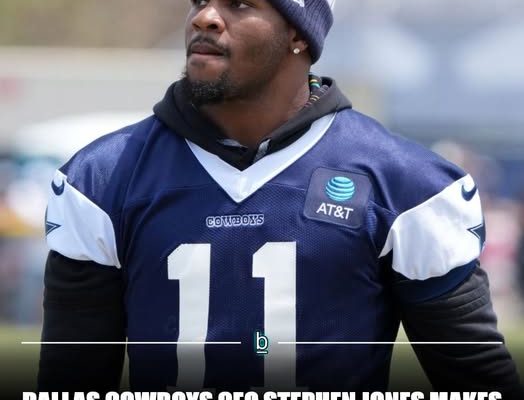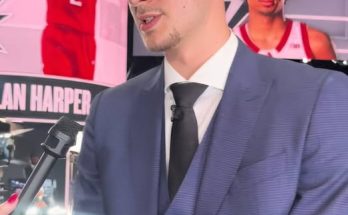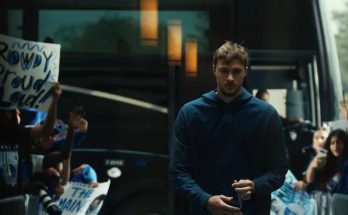The Dallas Cowboys, and more specifically the Jones family, are apparently doing everything they can to not sign superstar pass rusher Micah Parsons to a contract extension. While the situation has not exploded publicly into a full-blown controversy—yet—it has become clear to those around the league and close to the Cowboys organization that the front office is dragging its feet when it comes to locking in one of the most dynamic defensive players the NFL has seen in the last decade. With training camp already underway and the season fast approaching, the tension surrounding the lack of a long-term deal for Parsons is only growing more palpable.
Micah Parsons is not just a good player—he’s a transformative talent. From the moment he entered the league as a rookie in 2021, Parsons has redefined what it means to be a modern edge rusher. He was drafted as a linebacker but quickly showed that he could dominate off the edge with a rare blend of speed, strength, and football IQ. He’s fast enough to run down receivers, powerful enough to shed blocks from elite tackles, and instinctive enough to sniff out plays before they develop. In his first three seasons, he’s made two All-Pro teams, finished top-three in Defensive Player of the Year voting multiple times, and posted double-digit sacks each year. Simply put, Parsons is the cornerstone of the Cowboys’ defense—and arguably their entire team.
Yet despite this, Jerry Jones and the Cowboys’ front office seem to be playing a dangerous game of contract chicken. Instead of making Parsons the highest-paid non-quarterback in the NFL—as many expected—they’ve adopted a wait-and-see approach that has only increased speculation and confusion. There are those in the league who believe the Cowboys are hesitant because of the precedent it sets, worried about what kind of financial structure a deal of that magnitude would require. Others think it’s a negotiating tactic, a way to try to extract some kind of hometown discount. Whatever the reason, the optics are terrible.
Cowboys fans have long been accustomed to the team’s glacial pace when it comes to signing players. It took what felt like an eternity to sign quarterback Dak Prescott, and even then the negotiations turned acrimonious before the two sides finally reached an agreement. The Cowboys dragged their feet with DeMarcus Lawrence, Amari Cooper, and even Ezekiel Elliott. But the situation with Micah Parsons feels different. This is not a player in decline or a guy with question marks around his production or durability. Parsons has been everything the Cowboys hoped for—and more. He’s the very definition of a game-wrecker. To not prioritize locking him up could send a disastrous message to the locker room, and possibly to other stars on the team with looming contract discussions of their own.
The cap situation is always the go-to excuse in Dallas, and the front office has leaned heavily on that narrative. But every NFL franchise has the same salary cap to work with. Other teams find a way to keep their stars happy, often bending over backwards to retain generational talent. The 49ers managed to pay Nick Bosa. The Rams found a way to extend Aaron Donald. The Browns paid Myles Garrett. The Chiefs gave Chris Jones his bag. Each of those teams understands that elite pass rushers don’t grow on trees—and when you have one, you pay him before it becomes a problem. The Cowboys, however, seem determined to do it their way, risking a blow-up that could destabilize their locker room.
Sources around the team suggest that Parsons is understandably frustrated, though he’s doing his best to stay professional. He’s shown up for workouts, attended team meetings, and said all the right things publicly. But behind the scenes, there’s a growing sense of impatience. Parsons knows what he’s worth. His camp has done their homework. They know that he’s on a Hall of Fame trajectory and that the money is there if the Cowboys truly want to make it happen. There’s also the reality that every game he plays without an extension increases his injury risk. For a player who plays with as much explosiveness and ferocity as Parsons, the danger is not theoretical. A torn ACL, a freak accident, or even just a wear-and-tear issue could change everything in an instant. That’s why top-tier players want their money sooner, not later.
Adding to the tension is the fact that the Cowboys have made splashy offseason moves and flirted with other big contracts. They traded for Brandin Cooks, flirted with deals for free agents, and remain in the thick of other negotiations, all while pushing the Parsons situation to the back burner. That kind of mixed messaging doesn’t go unnoticed by players. When management opens the vault for one position group while dragging its heels with another, it sends a very specific message: you’re not the priority. That’s not just bad business—it’s also dangerous for team culture.
It also doesn’t help that the Cowboys’ defensive identity is built around Parsons. Defensive coordinator Mike Zimmer, now back in Dallas, has built schemes to exploit Parsons’ unique skills. He’s the linchpin of the defense, the chess piece that keeps offenses up at night. Without him, the entire structure shifts. His ability to rush the passer, drop into coverage, and create chaos in the backfield is not something that can be replicated with another player. Teams often have to double-team him, which frees up opportunities for others on the defense to make plays. He’s not just a star—he makes everyone else better.
Parsons’ teammates have started to voice subtle support for him, too. In interviews, you can hear it in the tone, the way guys emphasize his value to the team. They’re trying not to stir the pot, but it’s clear that they want him paid. NFL locker rooms are tight-knit, and players understand the business side. They know what it means when one of their own isn’t taken care of. It plants seeds of doubt, makes guys wonder if they’ll be treated the same way when it’s their turn. That kind of uncertainty can fracture a locker room, even if it’s not outwardly visible.
For Jerry Jones and his son Stephen, who handles most of the team’s salary cap and personnel management, this has become a pivotal moment. The Cowboys have long marketed themselves as “America’s Team,” a franchise steeped in tradition, championships, and elite talent. But it’s been nearly three decades since they last won a Super Bowl, and fans are growing restless. The team has had good regular seasons, but has repeatedly fallen short in the playoffs. Parsons is one of the few players who looks like he could change that. He has the ability to swing games on his own. That’s not an exaggeration—he’s that impactful.
Yet, the longer the Cowboys wait, the more complicated things become. Parsons’ price tag will not go down. If anything, it will only increase as other top defenders sign new deals. The longer Dallas waits, the more leverage Parsons gains. And if they go into this season without an extension, they risk a holdout next offseason—or worse, a fractured relationship that can’t be repaired. It’s one thing to gamble with average players. But gambling with someone like Parsons? That’s playing with fire.
The NFL is a business, but it’s also about loyalty, trust, and respect. Right now, the Cowboys are sending the wrong signals. They’re asking Parsons to continue being elite without giving him the security he’s earned. They’re asking fans to believe in their long-term vision without showing the foresight to protect their most valuable defensive asset. They’re asking the locker room to buy in, while showing that star-level performance doesn’t guarantee star-level compensation.
Parsons, for his part, has remained relatively quiet—at least publicly. But make no mistake: this is a calculated silence. His representatives are watching. The media is watching. Other teams are watching. If Dallas lets this spiral, there will be no shortage of suitors willing to make him the highest-paid defender in league history. And while he’s still under team control for the next two seasons, including the fifth-year option, it would be shortsighted to assume that time is on Dallas’ side. A disgruntled superstar can make life miserable for an organization, and the Cowboys are already under pressure to win now.
What makes this situation even more maddening for fans is the fact that Parsons has embraced Dallas. He’s been visible in the community, embraced the team’s legacy, and brought an intensity to the franchise that harkens back to the glory days of the 1990s. He’s the kind of player you build around, not alienate. The longer this stalemate goes on, the more it threatens to overshadow the season ahead. Every sack he records, every dominant performance he puts on film will be a reminder of just how valuable—and how underpaid—he is.
There’s still time for the Cowboys to fix this. A deal could get done before the season starts. The Jones family could step in and right the ship. But history has shown that they don’t often operate on urgency until they’re backed into a corner. They pride themselves on doing things on their terms. That kind of stubbornness has cost them before. If they’re not careful, it could cost them again—this time, with one of the best defensive players in football walking away because the team that drafted him didn’t value him enough to get the deal done when it mattered most.



